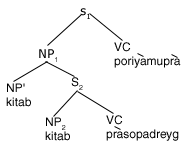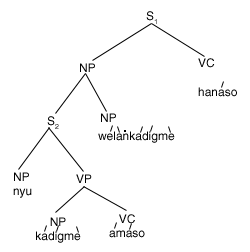(1) Relative Clause on to the Subject NP :
|
NP ® NP + S
|
Consider the sentence
|
|
(284) |
/kitabwč1
prąsopadreyg2 |
|
book-Nom good-Pa-print |
|
poriyąmuprą3/ |
|
read-T-also-well |
|
`printed2 books1
are easy to read3’ |
| |
This is derived from the two sentences.
|
|
(285) |
/kitabwč1 poriyąmuprą2/ |
|
book-Nom read-T-also-good |
|
`books1 areeasy to read2’
|
|
(286) |
/kitabwč1 prąsopadreyg2/ |
|
book-Nom good-Pa-print |
|
`books1 are printed well2’
|
|
|
 |
The lower NP is deleted. The
cases are assigned in the following manner. The NP directly dominated by the
S-node in the matrix sentence is in nominative case. The NP deletion occurs
only if nominative case. The NP deletion occurs only if the lower NP is a
nominative NP. This prevents the NP deletion in sentences like -
|
|
(287) |
/nyś1
mč2 ąmįso3 |
| |
you-Nom man-Acc call-RecP |
| |
wčlą kįd kįd gmč4
hanįso5/ gmč4
hanįso5/ |
| |
those-all-man come-RecP |
| |
`all those men4
(whom)2 you1 called3 have came5’
|
|
|
 |
The lower NP is deleted. The cases are assigned
in the following manner. The NP directly dominated by the S-node in the
matrix sentence is in nominative case. The NP deletion occurs only if
nominative case. The NP deletion occurs only if the lower NP is a nominative
NP. This prevents the NP deletion in sentences like -
|
| This is derived from two simple sentences. |
|
(288) |
/nyś1 kįd gmč2 įmįso3/ gmč2 įmįso3/ |
| |
you-Nom all-man call-RecP |
| |
`you1
called3
all men2’
|
|
(289) |
/wčlą kįd
kįd gmč1
hanįso2/ gmč1
hanįso2/ |
| |
those all-man-Nom come-RecP |
| |
`all those men1 came2’
|
|
(2) Relative Clause on to the Accusative NP :
Consider the sentence
|